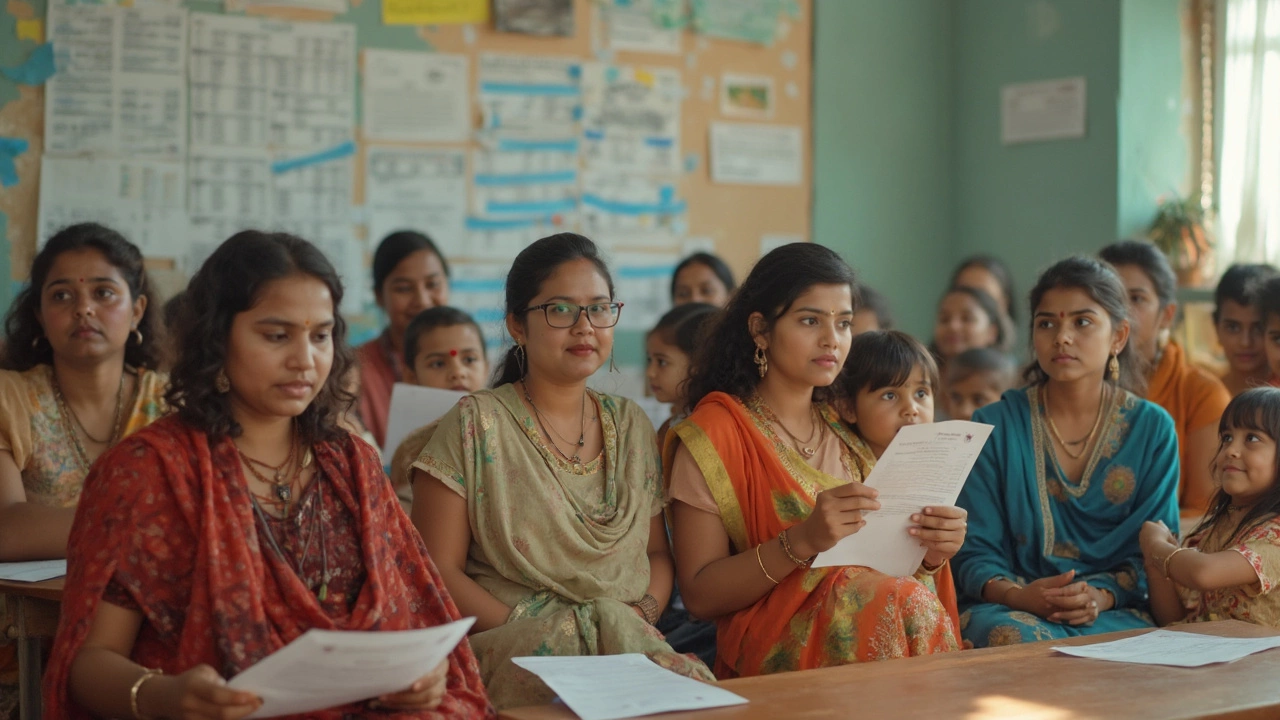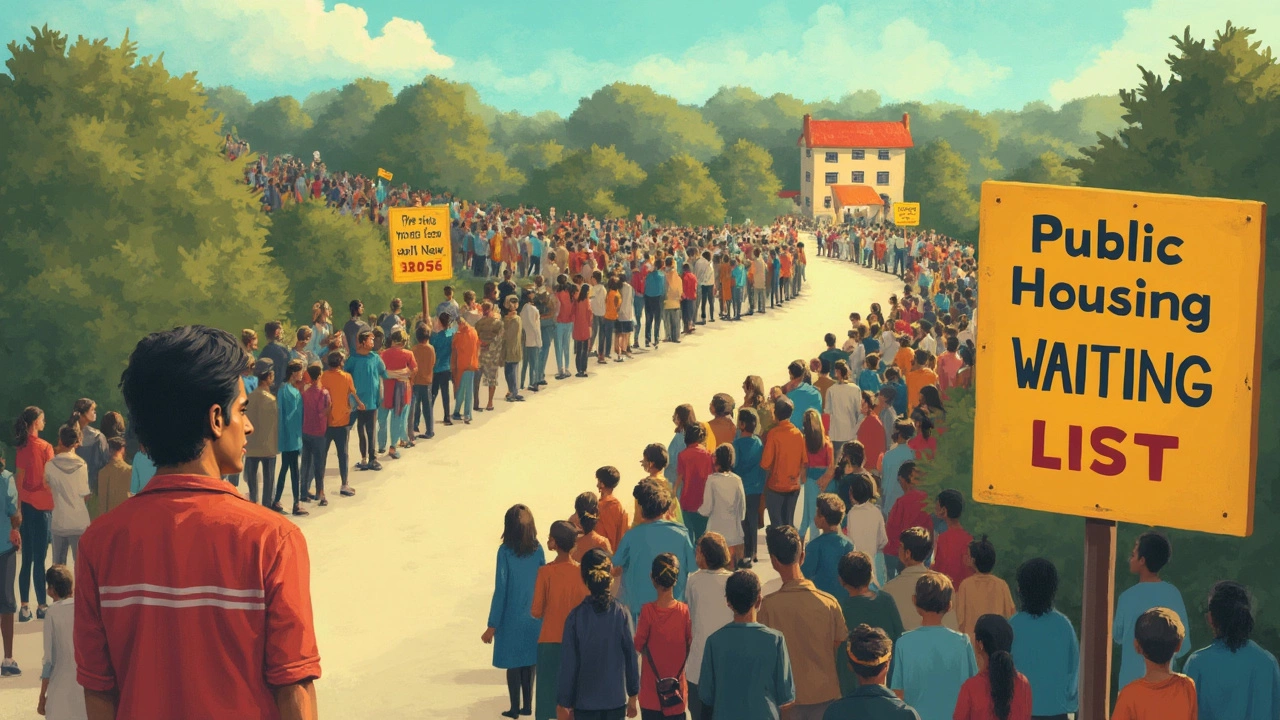How Long Is the Waiting List for Public Housing in Virginia?

Apr, 17 2025
If you’re looking at public housing in Virginia, get ready for some serious patience. The wait list isn’t just a couple months—it’s often years. In big metro areas like Richmond or Northern Virginia, the average wait is between two and five years, depending on where you apply and how urgent your situation is.
What’s making the list so packed? Supply just can’t keep up with demand. Rents are skyrocketing all over, and more families need help every year. Housing authorities use a lottery or point system, so even if you apply early, expect a long line ahead of you. Don't let anyone tell you it's 'first come, first served'—that's just not how it works these days.
- Real Numbers: Average Wait Times in Virginia
- What Makes the List So Long?
- Where You Live Changes Everything
- Tips to Survive the Wait
- The Truth About Moving Up Faster
Real Numbers: Average Wait Times in Virginia
If you’re curious just how long folks actually wait for public housing in Virginia, here’s the hard truth: it’s not a quick fix. Most people looking for affordable housing get put on a list that’s way longer than you’d expect. In big cities like Richmond and Alexandria, you’re staring at a wait of anywhere from 2 to 5 years. If you’re in places like Arlington or Fairfax, it can even stretch to 6 years or more.
The official data from the Virginia Housing Development Authority and local housing agencies shows it’s pretty bleak almost everywhere. Some smaller towns move a bit faster, but even there, you’re still likely to wait at least a year. This is because there just aren’t enough units leaving the turnover pool each year to match everybody who needs help.
Here’s a look at what wait times can actually look like:
| Location | Average Wait Time (Years) |
|---|---|
| Richmond | 3–5 |
| Norfolk | 2–4 |
| Arlington | 5–6 |
| Charlottesville | 2–3 |
| Roanoke | 2–3 |
Waiting lists also open and close with little warning, depending on how many people apply. When things open up, thousands of applications flood in within hours—sometimes crashing websites or phone lines. Authorities sometimes use a lottery system so not everyone who applies even gets on the actual list.
Affordable housing isn’t just a buzzword here—it represents a mountain of paperwork and months or years of emails and phone calls. Don’t count on getting an update every week. If you applied last year and haven’t heard a thing, that’s totally normal. As tough as this sounds, knowing the actual numbers gives you a better shot at planning ahead, rather than hoping for a call that’s just not coming soon.
What Makes the List So Long?
The public housing waiting list in Virginia isn’t just long because a lot of people sign up. The main reason? There aren’t enough affordable apartments to go around. A report from 2023 showed Virginia had just 61 available and affordable rental units for every 100 extremely low-income renters. The math just doesn’t add up for everyone who needs help.
Every year, more people apply as rents and home prices keep pushing families past their limits. Housing authorities in busy regions like Richmond, Norfolk, and Fairfax get slammed with thousands of applications when they reopen their lists. Some folks who joined a list in 2018 are still waiting for their number to come up in 2025. Frustrating, right?
Here are a few things that keep stretching the line:
- High demand, low supply: There’s just not enough public housing for the flood of people needing it now, let alone those who’ll need it next year.
- Not much new construction: New affordable housing projects move at a snail’s pace. Regulations and land costs slow everything down.
- Turnover is slow: When people finally get a place, they hold onto it. Spots open up when tenants move out or pass away, and that’s not frequent.
- Extra hurdles: Some public housing providers give preference to seniors, people with disabilities, or families facing emergencies. If that’s not you, you’re waiting even longer.
Take a look at this snapshot from 2024 showing how packed the lines are in some areas:
| City/County | Average Wait (Years) | Applicants on List |
|---|---|---|
| Richmond | 3.5 | 18,000 |
| Fairfax County | 4 | 22,000 |
| Roanoke | 2 | 6,000 |
It’s brutal, and no sign of things getting easier. Understanding why the wait is so long helps you plan—and maybe pushes some decision makers to speed up the process.

Where You Live Changes Everything
Your spot on the public housing waiting list in Virginia isn’t just about when you applied. Geography can change your odds way more than people think. Each area runs its own waiting lists. Some places have hundreds of people waiting, while others stretch into the thousands.
Take Northern Virginia, for example. Spots like Fairfax, Arlington, and Alexandria are incredibly competitive. Waiting times often hit 4 to 7 years. Down in Richmond, the list is a bit shorter—a typical family waits 2 to 4 years. Rural areas like Wise County or Southside move faster, sometimes handing out units after only a year or so. That’s rare, but it happens if demand is lower or there’s new funding.
| Region | Average Wait Time |
|---|---|
| Northern Virginia | 4-7 years |
| Richmond | 2-4 years |
| Hampton Roads | 2-3 years |
| Roanoke | 1.5-3 years |
| Rural (Wise County) | 1-2 years |
The catch? You can’t just apply everywhere. Most local housing authorities want you to live, work, or have strong ties to their area before you can get on their waiting list. So moving to a rural spot just to hop the line isn’t as easy as it sounds.
Another thing—some areas open their waiting list only once every year or two. Others use random lotteries and you might not even make the initial cut. It’s a patchwork system and the rules change from one county to the next. Always read the public notice or call your local housing office for up-to-date info before you set your hopes on getting in line.
Tips to Survive the Wait
The waiting list for public housing in Virginia can make you feel stuck, but a few practical moves can help you get through it. I've had friends wait years, so I've picked up a few tricks from their experience. Here’s how to make the time work for you rather than against you.
- Apply Everywhere You Qualify: You don’t have to stick to just one public housing list. A lot of people think you can only apply in your city, but you can (and should) apply to multiple housing authorities in Virginia at the same time. Each has its own list and wait time. Branch out—your odds go up if you cast a wider net.
- Stay in Touch with Housing Authorities: It might sound boring, but check in regularly; sometimes paperwork gets lost or rules change. Make sure your contact details stay current, so you don’t miss their notice when your name pops up. Some people lose their spot just because they moved and didn’t update their address.
- Gather Your Paperwork Now: You'll need proof of income, ID, and maybe even medical records, depending on your priority status. Dig this stuff up ahead of time so you’re not scrambling when your name is finally called. If you’re missing documents, they might bump you to the back of the line.
- Look for Priority Status: Some groups—like seniors, veterans, survivors of domestic violence, or people with disabilities—get bumped higher up the list. If you think you qualify, ask about special programs or a priority waitlist slot. Don’t leave it to chance.
- Keep an Eye on Affordable Housing Lists: Public housing isn’t your only option. Virginia has Low Income Housing Tax Credit (LIHTC) apartments and some private landlords accept housing vouchers. Put your name on those lists, too, if you need a backup plan.
| Reason | How to Avoid It |
|---|---|
| Changed address or phone, didn’t update | Check in every 3-6 months and confirm details |
| Missed mail or emails from housing authority | Add them to your contacts and check spam folders |
| Incomplete or outdated paperwork | Prep your docs early, keep copies, and ask what’s needed |
While the waiting list won’t move overnight, staying organized and proactive keeps you from losing all that time in line. A little hustle can pay off big when your number finally comes up.

The Truth About Moving Up Faster
If you're hoping to speed things up on the public housing waiting list in Virginia, here's what you need to know—straight up, there’s no magic shortcut. Housing authorities set up the system to be as fair as possible, with strict rules about who gets bumped up. But there are a few legit ways some people move ahead of others.
Most housing offices use a preference system. That means your spot isn’t just about when you applied. If you’re a senior, a veteran, have a disability, or if you’re at risk of homelessness, you can get higher priority. For example, if you’re a single parent with minor children, you might also move up if your income is really low. But you need paperwork to prove your situation—no proof, no priority.
- Veterans often get special consideration.
- Families with children can go up the list if they’re in danger of losing their current home.
- People with disabilities or seniors are usually considered vulnerable, so their applications can move up too.
- If you’re dealing with domestic violence or natural disasters like a fire or flood, you may qualify for emergency status. This can mean a much shorter wait, sometimes only weeks instead of years.
Here’s something a lot of folks don’t realize: you can apply to more than one waiting list at the same time. Each public housing agency is separate, so throw in applications wherever you can—Richmond, Norfolk, Fairfax, wherever you’re able. Just keep in mind, if you get called in a town you can’t move to, you’ll have to turn it down. But for a shot at getting housing sooner, it’s worth it.
Check out this table from a 2024 state report showing preference types and how they affect the waiting list:
| Preference Type | Average Wait Time Reduction |
|---|---|
| Homeless or at risk | Up to 2 years less |
| Veterans | 1-2 years less |
| Disability/Senior | 1 year less |
| General Applicants | No reduction |
Don't get tricked by scammers saying they can "move you up" for a fee. Legit public housing agencies never charge to change your place on the list. Double-check everything with the agency itself—no shortcuts, just rules and your honest situation. If any part of your status changes while you’re waiting—like losing your job or a big family event—update your info. It could shift your spot and save you months, or even years.